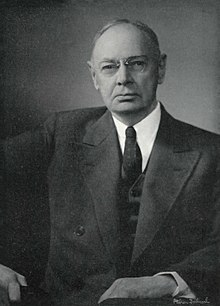William Robinson Brown | |
|---|---|
 | |
| Born | January 17, 1875 Portland, Maine, U.S. |
| Died | August 4, 1955 (aged 80) Dublin, New Hampshire, U.S. |
| Occupation(s) | Brown Company, Woods Division Manager |
| Known for |
|
| Spouse | Hildreth Burton Smith |
| Children | 5, including Frances H. Townes (nee Brown) |
William Robinson "W. R. " Brown (January 17, 1875 – August 4, 1955) was an American corporate officer of the Brown Company of Berlin, New Hampshire. He was also an influential Arabian horse breeder, the founder and owner of the Maynesboro Stud, and an authority on Arabian horses.
After graduating from Williams College, Brown joined the family corporation, then known as the Berlin Mills Company, and became manager of the Woods Products Division, overseeing the company's woodlands and logging operations. He became an early advocate for sustainable forest management practices, was a member of the New Hampshire Forestry Commission from 1909 until 1952, and served on the boards of several forestry organizations. As chair of the Forestry Commission, Brown helped send sawmills to Europe during World War I to assist the war effort. He was influenced by the Progressive movement, instituting employee benefits such as company-sponsored care for injured workers that predated modern workers' compensation laws. As a Republican, he served as a presidential elector for New Hampshire in 1924.
Brown founded the Maynesboro Stud in 1912 with foundation bloodstock from some of the most notable American breeders of Arabian horses. He looked abroad for additional horses, particularly from the Crabbet Arabian Stud, and imported Arabian horses from England, France and Egypt. At its peak, Maynesboro was the largest Arabian horse breeding operation in the United States. In 1929, he wrote The Horse of the Desert, still considered an authoritative work on the Arabian breed. He served as President of the Arabian Horse Club of America from 1918 until 1939. Brown was a remount agent and had a special interest in promoting the use of Arabian horses by the U.S. Army Remount Service. To prove the abilities of Arabians, he organized and participated in a number of endurance races of up to 300 miles (480 km), which his horses won three times, retiring the U.S. Mounted Service Cup. This accomplishment occurred even though The Jockey Club donated $50,000 to the U.S. Army to buy Thoroughbreds that tried but failed to beat the Arabians. Brown's legacy as a horse breeder was significant. Today, the term "CMK", meaning "Crabbet/Maynesboro/Kellogg" is a label for specific lines of "Domestic" or "American-bred" Arabian horses, many of which descend from Brown's breeding program. In 2012, the Berlin and Coös County Historical Society held a 100th anniversary celebration of the stud's founding.
Although Brown family members sold personal assets to keep the Brown Company afloat during the Great Depression, including Brown's dispersal of his herd of Arabian horses in 1933, the business went into receivership in 1934. Brown remained in charge of the Woods Division through the company's second bankruptcy filing in 1941. He retired from the company in 1943 and died of cancer in 1955. His final book, Our Forest Heritage, was published posthumously, and his innovations in forest management became industry standards.